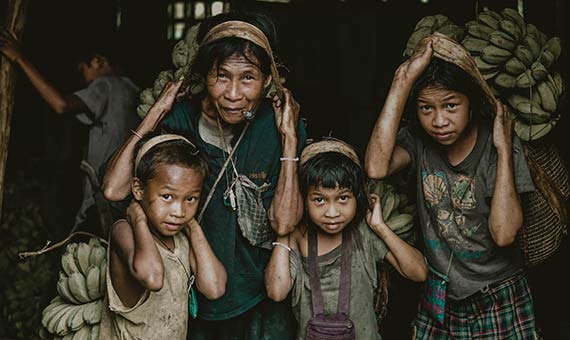Some of the psychological mechanisms that developed in the course of the human species’ evolutionary history directly affect its current networks of trust and cooperation.
In this regard, we highlight the results of a cross-cultural study carried out recently comparing two regions where a great diversity of ethnic groups coexist: Ghana and Oaxaca (Mexico). These places, so different in cultural and environmental terms, are ideal for analyzing the influence of context on social interactions with the aim of determining the universal characteristics of trust and cooperation networks with respect to their contextual influences. In the multidisciplinary methodology used in the study, the information obtained through personal cooperation networks (size, composition and characteristics) was combined with the information obtained from interviews (trust network characteristics, attitudes affecting trust and cooperation, and possible motivators and inhibitors of such relationships), taking into account the economic environment and the history of such groups. The results show that the emotional links underlying such trust relationships and the cognitive limitations that force such networks to be limited to small groups are universal characteristics.

More difficulties, greater trust
However, differences were observed between the two groups, with participants in northern Ghana showing broader networks of trust and cooperation than Oaxaca participants – extending far beyond family members to other members of the community and other ethnic groups –, as well as higher levels of trust and more active attitudes towards incorporating new members into the group and resolving conflicts. These differences that promote higher levels of cooperation occur precisely in the region where living conditions are more difficult and where the cultural path of social relations has been based largely on emotional ties (lineages, clans, tribes), in contrast to the more normative linkage that characterizes social relations in Oaxaca. Thus, this study supports the idea that the psychological mechanism underlying attitudes of trust and the most common cooperative behavior requires direct or close relationships to create emotional bonds between individuals, which limits their scope but allows a certain margin of flexibility through cultural resources, depending on the needs of the individuals.
What happens when the “tribe” is not chosen voluntarily?
Once the characteristics of trust and cooperation networks, generated spontaneously in the lives of individuals according to their natural and cultural environments, are recognized, these networks are analyzed in artificially generated groups, i.e., beyond the express decision of individuals, as happens in cases of labor groups. So it is a question of understanding how the above-mentioned psychological mechanisms in these groups work, and the possibilities of extending their effect beyond people who are the direct object of personal trust.

To this end, personal trust relationships and cooperative behavior are compared using economic games (such as the so-called “prisoner’s dilemma”) between members of two Oaxaca labor groups: the teachers at a school and members of an association of fishermen. The two groups share the same culture and high levels of trust towards their trusted people within the group, but differ in their economic and educational levels, which are higher in the teachers’ case.
Although the groups coincide in showing high levels of cooperation and altruism towards their trusted persons, regardless of educational and economic differences, which demonstrates the strength of the emotional bond generated by the psychological mechanism of personal trust, they differ in their cooperative behavior with the rest of the group members. Thus, the teacher group, which cooperates most with other members of the group, also has a trust network centered around an individual who, besides being a person trusted by the majority of members, is also a person who stands out more within the group as being highly reliable.
Trust groups and subgroups
However, the group of fishermen has a trust network in which the most trusted people within the group do not, in turn, trust each other. These trust network characteristics seem to play a significant role in extending the flow of trust indirectly among group members and in providing higher levels of overall co-operation. The study also suggests that the network measurement known as the “clustering coefficient”, which indicates in this case the level of grouping of personal trust relationships around smaller groups within the network, can be an effective indicator of the level of trust and cooperation generated within the whole group.
Anthropology and its studies go a step further in understanding how trust’s psychological mechanism works and how it can be stimulated according to context.
Antoni Gomila and Cristina Acedo Carmona
University of the Balearic Islands
References
Comments on this publication